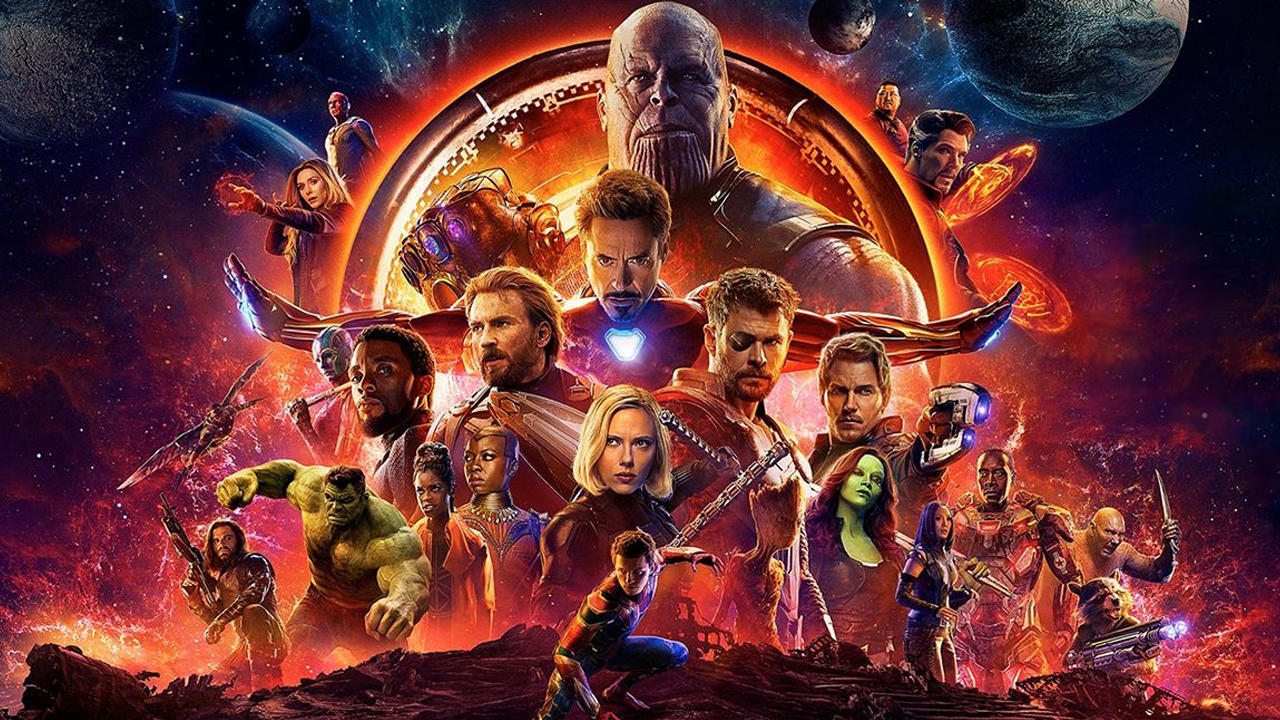Avengers: Infinity War is a movie that logically can’t live up to the hype. Ten years in the making, and foreshadowed for at least six of those years, Avengers: Infinity War represents the culmination of a decade’s worth of Marvel Cinematic Universe movie storylines. It contains almost every MCU movie superhero that has come to define a golden age of big screen superheroes, all working together to stop a villain that has been teased since The Avengers first made movie history with its never-before-attempted big screen superhero crossover back in 2012. It brings together macguffins that have been scattered across literally every conceivable corner of this shared universe, all of a sudden united to decide the fate of the MCU on a literal universal scale. This ambition, packed with an enormous $300 million-$400 million+ production budget, along with being the first movie in history to be filmed entirely with IMAX cameras, logically makes Avengers: Infinity War too big, too impossible, too over-ambitious. Like I said, Avengers: Infinity War is a movie that just can’t logically live up to the hype.
And yet it somehow does.
Avengers: Infinity War is quite easily one of the most ambitious movies ever attempted, period, in any genre. Like The Avengers six years ago, it had everything seemingly working against it, and innumerable ways that it could have spectacularly flown off the rails, and gone very, very wrong. Despite that, this never happens. Inconceivably, Avengers: Infinity War delivers on ten years of buildup, ten years of promises, and ten years of overwhelming fan expectations, particularly after Marvel Studios has made a career up to this point of churning out hit, after hit, after hit, and making it look easy. This movie should have gone wrong. It should have failed. It should have disappointed… But it doesn’t.
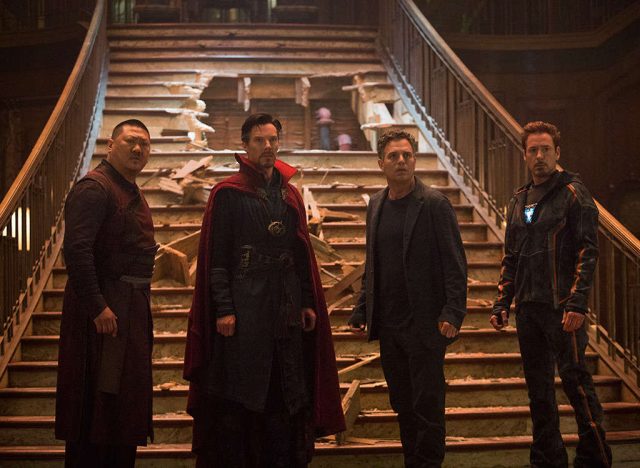
Mind you, Avengers: Infinity War does have its flaws, just like any other movie, big or small. The proudly overstuffed cast of characters does lead to some personalities being overshadowed or omitted entirely (even if most of the featured players get at least one great moment to shine), and there are a few slower spots that may not perfectly hold the attention of those outside of the die-hard Marvel/Marvel Studios fanbase. When taken with a spectacle this grand, this ambitious, and yet also this effortlessly fun, hilarious, action-packed and genuinely heartbreaking in its overall final product however, any flaws seem insignificant in the face of the deluge of achievements that Avengers: Infinity War also manages to pull off. For Marvel fans, Avengers: Infinity War is quite simply the best ten-year anniversary celebration that Marvel Studios’ movies could have possibly asked for, and will no doubt go down as an instant classic. For more impartial moviegoers, this is still one of the most massive and impressive cinematic blockbusters that you’ll ever see, and one that consistently entertains and tugs at the heartstrings too, even if some of the flourishes will definitely be best appreciated by those who have already been firmly on board with all of the MCU movies, since they first began with Iron Man in 2008.
There are many, many, many personalities at play in Avengers: Infinity War, which even a cursory glance at the trailers and posters should be able to tell you. This is a lot more than simply forcing an excuse for the Avengers themselves to unite in battle alongside other major MCU players like Spider-Man, Black Panther, Doctor Strange and especially the Guardians of the Galaxy (who are meeting the MCU’s earthbound heroes for the first time here) however. Avengers: Infinity War keeps building upon each hero and their ongoing story arc in more clever and unexpected ways, helping to reduce an overly diluted focus by splitting groups of heroes into separate ‘parties’ of sorts throughout the movie, all of which take care of one necessary step in the battle against Avengers: Infinity War’s main antagonist, Thanos. Even in the climactic final battle, the various heroes of the MCU never all stand simultaneously together. This doesn’t perfectly fix the occasional issue of overshadowing a couple of roles, but it definitely helps more than a movie that would have tried to constantly throw everyone into the same area together.
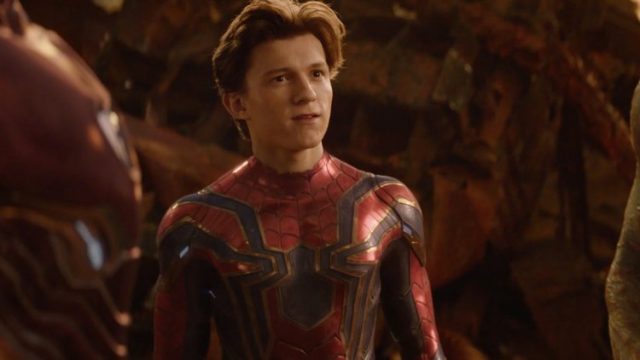
As fantastic as the MCU heroes that we know and love continue to be in Avengers: Infinity War though, the highest praise can definitely be reserved for Thanos, who marks the second defiance of Marvel Studios’ ‘villain problem’ in the same year, after Black Panther’s similarly complex and highly satisfying baddie, Erik Killmonger. Thanos has been teased in the MCU since a mid-credits stinger from The Avengers, a whole six years ago, and this is the first time that he actually gets a significant role in a movie, after a bit part in the first Guardians of the Galaxy movie from 2014, and another mid-credits stinger tease in 2015’s Avengers: Age of Ultron. After looming as a background presence for so long, there was a lot riding on Thanos being a worthy foe to the MCU’s heroes, and fortunately, Thanos really is one of the best elements of Avengers: Infinity War. Josh Brolin’s performance is simultaneously intimidating and coldly rational, creating an imposing, but still heartfelt villain that is impossibly powerful, yet also deceptively tragic. I would be remiss to spoil the many superb and shocking unexpected moments with Thanos, but rest assured that he is another of Marvel Studios’ best villains to date, and he was definitely worth the long six-year wait to fully see in action!
By contrast, the secondary villains, the Black Guard, portrayed here as the children of Thanos, are mostly straightforward thugs and lackeys for the most part, who often act as the universal enforcers when it comes to seeking out and swiping the Infinity Stones, the Marvel Studios movies’ big macguffins for the past several years. It’s the Infinity Stones being spread so far across the MCU at this point, and the Black Guard spreading out to try and lead Thanos to them, that manages to bring everyone so organically into conflict with Thanos, beyond the obvious fact that the entire universe is at stake with Thanos’ agenda as well. The Black Guard essentially provide an opportunity for even non-powered heroes like Black Widow, Okoye and Falcon to get in on the action, since any of them taking on Thanos directly would obviously be suicide, but this further helps to ensure that everyone gets a chance to be a badass, regardless of where their power index falls in the MCU movie pantheon.
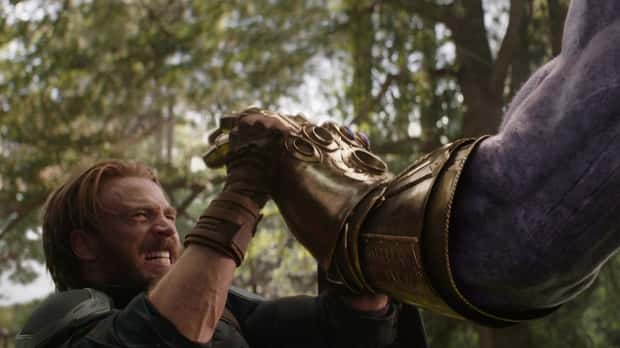
Unfortunately, this is about as much detail as can be mentioned with the cast of Avengers: Infinity War, without significant spoilers. There are many twists and turns with the heroes and villains throughout Avengers: Infinity War, and naturally, Marvel fans especially should know as little as possible about the movie before seeing it. I can say however that many of your expectations for the characters are almost certainly wrong, in a good way. Some things run deeper than fan theories previously imagined, while others were surprisingly overthought by the Marvel fan community. Just about every character payoff, as well as the payoff of the entire movie for the MCU’s movie ensemble, is highly well-executed though. When the credits roll, the characters definitely won’t be in the same station or state-of-mind that they started the movie in!
The plot of Avengers: Infinity War is something else that is difficult to talk about too much without some significant spoilers. What can be mentioned though is that Avengers: Infinity War is long, running at a rather beefy 150-minute runtime. This time will likely fly right by for avid Marvel fans in particular however, who will be enraptured by the sheer scope of what’s going on, along with the reliable onslaught of quips and cracks that the MCU’s heroes continuously make, despite the heavy, universe-threatening conflict that’s unfolding around them. For those outside of Marvel Studios’ devout fanbase though, the wisecracks, action scenes and emotional moments are still frequent and highly enjoyable too, so you don’t necessarily have to be one of Stan Lee’s Truest Believers to find plenty of entertainment value throughout Avengers: Infinity War.
For the less-than-devout Marvel follower though, this doesn’t change the fact that there are a few slower, exposition-heavy stretches in Avengers: Infinity War here and there. Nothing in the movie feels superfluous or inessential, despite the fact that it’s two-and-a-half hours long, but those outside of Marvel’s fanbase will probably have a bit less patience for the litany of new weapons and strategies that have to be discovered and concocted throughout the runtime, to keep the fight against Thanos going. Likewise, those with less of a strong memory or ability to concentrate may also find the experience a bit scattered and overwhelming at times, since Avengers: Infinity War does spend a lot of time leaping and bounding between several different corners of the MCU’s entire universe, sometimes with seemingly no rhyme or reason. Sometimes, you’ll get a big shocking moment that inexplicably leads into a joke scene on the other side of space, and for non-fans of Marvel, that will probably give them a bit of confusion and tonal whiplash.
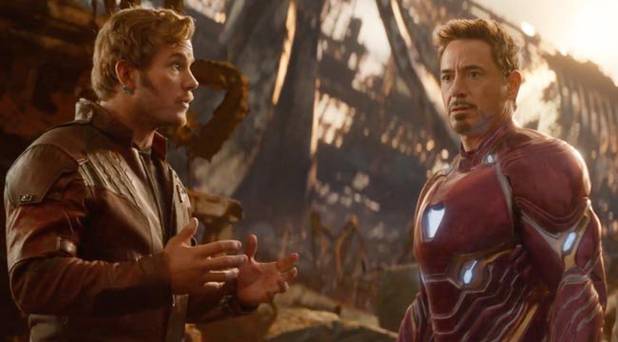
That said, there is certainly a lot of ground to cover, and the fact that Avengers: Infinity War jumps around quite frequently is a bit of a necessary evil, when you consider that Marvel Studios is trying to put together a blockbuster that is quite literally unfolding across the scale of an entire cinematic universe, not just Earth, or even a couple of planets. On the bright side however, like I said, nothing in the movie feels like it wastes the audience’s time, and everything does manage to come together and have its place in a fully intense and satisfying endgame. Everything leads into another satisfying turn, even if some explanations and events are slower in the moment. Even more impressive is that Avengers: Infinity War constantly finds clever ways to play with fan expectations, which only enhances the many shocks and unexpected twists that occur in this culmination of the MCU movies’ current events. Like the character arcs, it’s extremely doubtful that you’ll be able to predict how the story unfolds in advance, and this will keep you glued to the screen, even if you may have to hold out on going to the bathroom for a while!
(NOTE: The spoiler section, when clicked, can’t possibly discuss the many, many spoiler details of note in Avengers: Infinity War. It will however address absent characters, how a couple of ongoing MCU plot holes end up resolved and coming into play, the lone post-credits scene, and the status of how the MCU’s television arm may be affected by the events of the movie.)
Another character that is completely absent, but is eventually foreshadowed, is Captain Marvel, whom we know will be debuted by Brie Larson next year, both in next March’s dedicated solo Captain Marvel movie, and the still-untitled fourth Avengers movie that’s releasing at the start of next May. While Captain Marvel is not explicitly identified, her presence becomes the centerpiece of Avengers: Infinity War’s lone post-credits scene, which unfolds after the entire credit roll has finished. This post stinger also marks the only appearance of Samuel L. Jackson’s Nick Fury and Cobie Smulders’ Maria Hill in Avengers: Infinity War, as they both get caught up in the aftermath of Thanos’ invasion. This leads to Fury frantically activating a pager-like device that drops to the ground as the camera zooms in, with the pager’s display eventually showing Captain Marvel’s symbol, before a fade to black. It’s fairly straightforward, but it does get the point across that Captain Marvel is coming, and if Fury is calling her now, and not even when the Chitauri and Ultron were present threats, then Earth must truly be in inconceivable danger!
Aside from the whereabouts of Captain Marvel, which are starting to get touched upon in that post-credits scene, Avengers: Infinity War also finally resolves a couple of lingering plot holes in the MCU, and surprisingly, virtually every fan theory was completely wrong about them. The first and most obvious plot hole that Avengers: Infinity War finally resolves is the whereabouts of the Soul Stone, the last Infinity Stone that’s still unaccounted for in the MCU, which is not in Wakanda, as most fans had predicted. Instead, the Soul Stone is on Vormir, a lesser-known planet from Marvel lore, and is given to whomever can prove they’ve earned it by sacrificing what they love most. Disappointingly, this makes the Soul Stone something of an afterthought in the MCU at this point, which is all the more frustrating when you consider that it’s one of the most powerful and important Infinity Stones in the Marvel Comics universe. Much less disappointing however is the Soul Stone’s shocking keeper; Red Skull!
The fate of Red Skull has been an ongoing mystery since he was seemingly beamed away by the Tesseract/Space Stone in 2011’s Captain America: The First Avenger, but apparently, he ended up on Vormir to guard the Soul Stone, and is now portrayed by The Walking Dead’s Ross Marquand, rather than Hugo Weaving. Red Skull’s status as a Soul Stone keeper essentially trades one MCU mystery for another, since Red Skull’s reveal is meant to be a big surprise for the audience, and his life and duties on Vormir are never actually detailed in this particular movie. Nonetheless, it’s apparent that the planet has prevented Red Skull from aging, and this appearance also confirms that he never died, despite the characters’ belief that he did in Captain America: The First Avenger. Whether or not Red Skull will ultimately return to Earth to menace the heroes of the MCU, and particularly Captain America, is also unknown at this point, but Marvel fans are bound to be very happy about the fact that one of the MCU’s most disappointingly under-utilized villains is thankfully still alive, and does hold the opportunity for a more satisfying role down the line.
Finally, the last question that will likely be on many Marvel fans’ minds is whether or not Avengers: Infinity War features any of the MCU’s television characters, or at least tips the hat to the events of the MCU’s television shows. The short answer is, it doesn’t, on both counts. This will likely be very disappointing for Marvel fans, since this would have been the ideal opportunity to at least make a nod to the personalities and events of Agents of S.H.I.E.L.D., Runaways or the various Netflix shows that are all supposedly set in the MCU. Disappointingly, despite this being the tenth anniversary celebration of the MCU, the television side of Marvel’s shared live-action universe remains excluded from the fun. Maybe next year?
With previous Avengers movie director, Joss Whedon stepping down from his role after 2015’s Avengers: Age of Ultron, Avengers: Infinity War is instead being helmed by sibling Captain America sequel directors, Joe and Anthony Russo. Despite the director change however, Avengers: Infinity War still stays true to the spirit of what made the previous Avengers movies work so well (even if the first worked more than the second), while also bringing in the best elements of the Russo brothers’ direction in the Captain America sequels. The Russo brothers have made a handful of concessions in the move from the Captain America movies to the Avengers movies, most notably ditching the huge location prompts from Captain America: Civil War, as well as the shaky cam that was prevalent in several action scenes throughout both Captain America: The Winter Soldier and Captain America: Civil War. There is a bit of an effort to capture the creatively unpredictable, but incessantly cheeky character-driven directing of Joss Whedon, though the Russo brothers do also manage to make Avengers: Infinity War their own, especially with an increased focus on heavy questions and ever-encroaching despair, in contrast to Whedon’s former Avengers movies, where the danger felt a little more colourful and fun, even when the world was at stake.
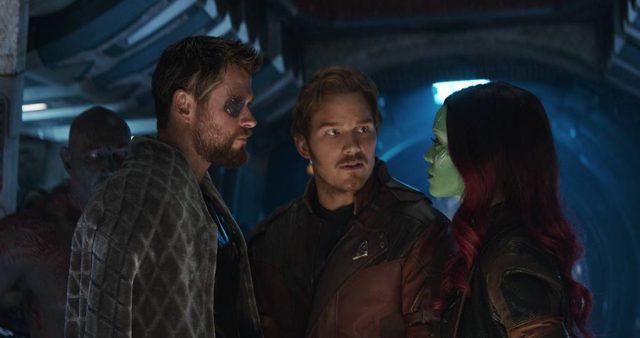
The real highlight with the Russo brothers’ direction however is how they so cleverly keep Marvel fans guessing. It’s kind of incredible that no one across the world and various media outlets correctly predicted how the events of Avengers: Infinity War would ultimately come together. Even when you think you know how a scene will play out, it’s just the Russo brothers intentionally setting the stage to play with your expectations, before yanking the rug out from under you, with a twist that should have actually been obvious to you. This is extraordinarily clever misdirection, since even the most intelligent of Marvel fans will take the Russo brothers’ bait in a lot of the movie’s biggest scenes, simply due to how well they play with the franchise’s tropes, and many movie tropes in general. This helps to make the shocks feel more severe, and the emotions feel more potent, because the viewer is taken off guard as effectively as the characters are, whenever the story needs to throw a big curveball, of which it has many to throw.
Finally, the Russo brothers have also expertly blown up the scale of their Marvel movie directing style, going from more intimate and grounded conflicts like in their Captain America sequels, into a more universal and cosmic-fueled conflict, without missing a beat. Even as the heroes move across space and between various planets, the conflict never feels less pressing or engaging, and nor do the characters ever feel false or out-of-place, even amid the massive cast of Avengers: Infinity War. While there are a few passing annoyances with some characters occasionally acting out-of-character, at least as we came to know them in other Marvel Studios movies, this is likely a symptom of having different directors this time, and even so, you never get the sense that these many personalities and franchises don’t mix together well. During the scenes with the Guardians of the Galaxy, this feels like an authentic Guardians of the Galaxy movie, for example. The same is true of Doctor Strange, or Spider-Man, or indeed the Avengers themselves. Despite the enormous crossover that has to take place in Avengers: Infinity War, everyone mostly meshes together well, and yet again, the MCU proves that it doesn’t betray its singular character and world visions in the name of aligning its many movie personalities into the same shared battle.
Alan Silvestri returns to score the soundtrack of Avengers: Infinity War, after bowing out of composing duties for 2015’s Avengers: Age of Ultron, and his return is quite welcome. Silvestri’s fantastic score for the original The Avengers from 2012 provides a loose, but strong foundation to some all-new compositions in Avengers: Infinity War, which manage to weave in a clever and cool mishmash of the musical sensibilities from across all of Marvel’s movie franchises. When Doctor Strange is on-screen for example, the score subtly changes to have more floaty and surreal chords. When the Guardians of the Galaxy are featured, the score incorporates more retro and synth nods. Naturally, when the Avengers are prominently featured, some of Silvestri’s old Avengers themes from the original 2012 movie are also dusted off and given weightier new twists and revamps. The musical sensibilities of the MCU come together just as effortlessly as the characters they represent, being yet another disparate series of elements that shouldn’t go together, yet somehow they do, providing a score that’s a wondrous celebration of ten years of MCU movie music, while also being a cool and action-packed soundtrack on its own merits!
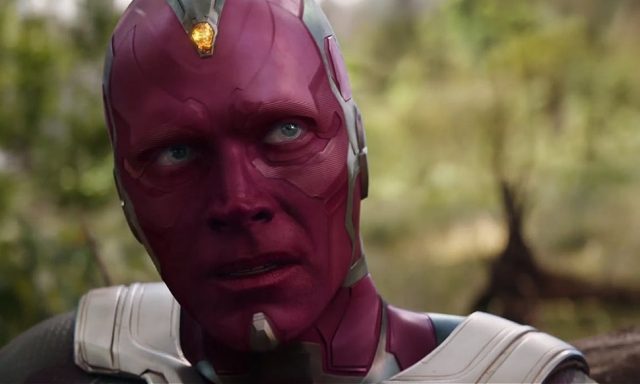
The audio engineering and sound mixing throughout Avengers: Infinity War definitely doesn’t pull punches either, and you ought to be especially wary of that if you’re seeing the movie in an IMAX theatre! The sheer might of Thanos, the Infinity Stones and other such unfathomable cosmic powers in the MCU is captured with theatre-shaking might, with IMAX theatres cranking the immersion to virtually ear-splitting levels of audio power. IMAX patrons in particular will probably walk out of Avengers: Infinity War with a bit of a sensory hangover, due to how brash and relentless a lot of the audio can be, though it will certainly suck you into the action with little effort. If you’re looking for an intense cosmic war, you definitely came to the right movie for it!
Being the first movie in history to be entirely filmed with IMAX cameras, Avengers: Infinity War is obviously an incredible new visual benchmark for filmmaking. It should go without saying that the entire movie is a stunning visual spectacle, and those with the privilege of being able to see the entire movie in an IMAX theatre are in for an even better experience! Thanks to the IMAX camera production, everything about Avengers: Infinity War truly feels massive. The sheer scope of the movie is almost overwhelming, as many larger-than-life sets continually greet viewers, and appear to envelope the entire audience within IMAX theatres especially. The IMAX camera production adds a lot more might and intensity to the action scenes as well, creating battles that feel as large and imposing as they do violent and chaotic. Finally, the CGI and motion-capture used for Thanos and the Black Order is very impressive, with Thanos in particular feeling astonishingly real and believable, despite being a CG effect. You’ll forget very quickly that Thanos is an effect too, and that speaks to both outstanding visual design and outstanding directing!
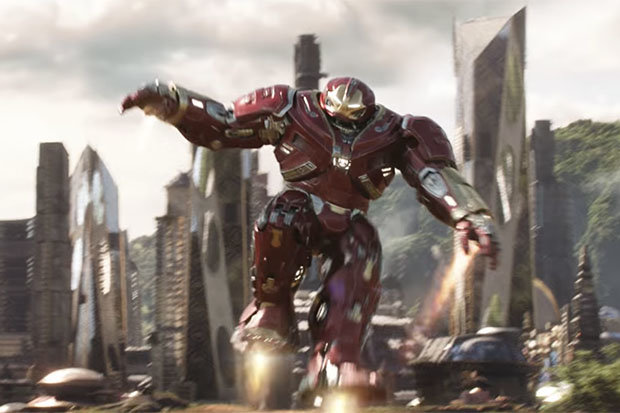
As for the 3D presentation, it’s pretty good, and definitely ups the intensity of the action and visual flourishes even further. You’ll definitely get the most out of the 3D presentation in an IMAX theatre however, where it’s maximized, and takes effective advantage of the IMAX cameras. In the IMAX 3D cut, the outer space scenes especially look and feel incredible, and even the earthbound scenes feel even more grand and immersive. The destruction of these locations and set pieces even further engages the audience in 3D and IMAX 3D as well, where viewers will be pulled more deeply into the unstoppable might of Thanos and the coming threat to the MCU. You don’t lose too much if you opt to see Avengers: Infinity War flat in 2D, but at the very least, it’s a movie that absolutely demands an IMAX theatre, which is what it’s meant for, and how it’s truly meant to be viewed.
There are many incredible moments of visual directing that I couldn’t possibly spoil, but rest assured that Avengers: Infinity War makes exceptional use of its landmark budget, as well as its cutting-edge new filming method, and stands alongside Doctor Strange, Thor: Ragnarok and the Guardians of the Galaxy movies when it comes to having some of the best special effects that the MCU has ever delivered! As with the characters and sound, the visuals can often represent a ‘Greatest Hits’ selection of the MCU’s favoured visual flourishes, whether it’s the neon-drenched cosmic landscape of Guardians of the Galaxy, the authentic, yet hyper-advanced African culture of Wakanda from Black Panther, or the bombastic, explosive tech-based carnage from Iron Man. Every corner of the MCU movies finally feel like they gel together into something of a whole product, and it feels like finally stepping back to look at an entire artistic canvas for the first time; Not only stunning, but also highly satisfying.
Avengers: Infinity War is one of the biggest movies that Hollywood, and likely anyone, has ever managed to successfully put together at all, much less make as great as it is! This is a movie that logically should have fallen apart and disappointed its audience, and yet, it delivers on its massive hype in pretty much every conceivable way. I suppose in that respect then that this is a truly worthy sequel to 2012’s The Avengers, which faced similar history-making circumstances, and nonetheless also became a gem and a triumph, both on its own merits, and as one of the best MCU movies overall, even today. If you were disappointed by the previous Avengers: Age of Ultron, which was ultimately a good, though not exceptional sequel to The Avengers, then you’ll especially feel that Avengers: Infinity War is the proper Avengers sequel that moviegoers truly deserve, especially when it brings so many other MCU movie characters into the fun with mostly outstanding success!
Non-fans of Marvel may feel that Avengers: Infinity War is overstuffed and occasionally unfocused in its direction, but when stacked against the scope, ambition, wit and power behind the production as a whole, these passing nuisances basically feel like mere nitpicks. Avengers: Infinity War may not be perfect, but it does succeed at all of its planned endeavours, namely in uniting all of the major movie personalities and factions of the MCU against a common, well-realized enemy, celebrating ten years of MCU movies by giving just about everyone a chance to make a big mark in the universe’s biggest battle to date (even if a few key players are sadly absent), and delivering a hilarious, dramatic and action-packed blockbuster in general. Somehow, someway, ten years’ worth of buildup and payoff was realized here, and it was realized excellently.

Even as the current run of the MCU reaches a climax, a climax that will continue to spill into next year’s still-untitled fourth Avengers movie, Marvel Studios achieves a wondrous ten-year anniversary celebration in Avengers: Infinity War, one that manages to fondly look back and bring together the best elements of the MCU’s movie legacy, while also boldly looking forward to what’s next, setting the stage for a brave and unprecedented new era for the MCU. Even devout Marvel fans will be pleasantly unsure of where things go from here, with directors, the Russo brothers once again not wasting an opportunity to create an uncertain new frontier for the MCU as a whole, just like they did in the wake of their Captain America movie sequels. Wherever the MCU ultimately decides to go next however, Avengers: Infinity War will ensure that audiences will be eagerly anticipating the next ten years to come for it!

